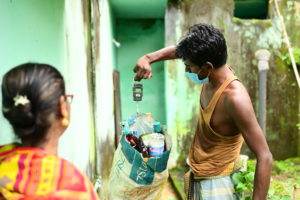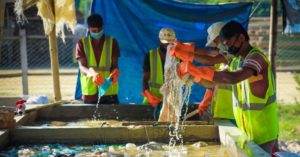Plastic pollution is a major challenge for people and the planet. Find out the best ways for individuals, groups and governments to tackle plastic pollution, clean up the world’s cities and help stop ocean plastic.
12 ways to reduce plastic pollution
Reduce
Many countries around the world have made commitments to reducing the amount of plastic being produced and used. Here are a few ways you can reduce plastic consumption in your own household:
1. Consider cooking using raw ingredients if you can – it cuts down on both packaging and food waste.
2. Avoid unnecessary packaging by buying from shops that use paper bags instead of plastic ones. Even better, shop at ‘scoop shops’, which avoid packaging altogether.
3. Glass is another potential alternative to plastic. How about getting your milk delivered in retro glass bottles by a traditional milk delivery service?
4. Did you know that some teabags contain plastic? Look out for compostable varieties, or switch to loose-leaf tea to avoid this.
Reuse
Despite our best efforts to reduce, it’s difficult to avoid plastic altogether. By thinking carefully about how you reuse your plastic products you can get the most out of each item and avoid adding to the pollution problem.
5. Keep old water and juice bottles and use them to water your plants.
6. Save plastic jars and pots and use them to store small household items.
7. Use old salad dressing containers to mix and store your own homemade condiments.
8. Cut off the bottom of large plastic bottles and use them as small planters or seed pots.
Recycle
Recycling plastic conserves natural resources and protects ecosystems, with less plastic ending up in rivers and oceans.
9. When you’re at the supermarket, look for products that use biodegradable packaging rather than plastic.
10. Make sure you’re recycling everything you can – check you local recycling service’s website for a full list of what can be put in your recycling bin.
11. Sign up to the Marine Conservation Society’s Plastic Challenge for a fun way to help your family monitor their recycling habits.
12. Use your consumer voice by calling out shops that use excessive packaging and encouraging food retailers to provide reusable containers.
Why is plastic bad for the environment?
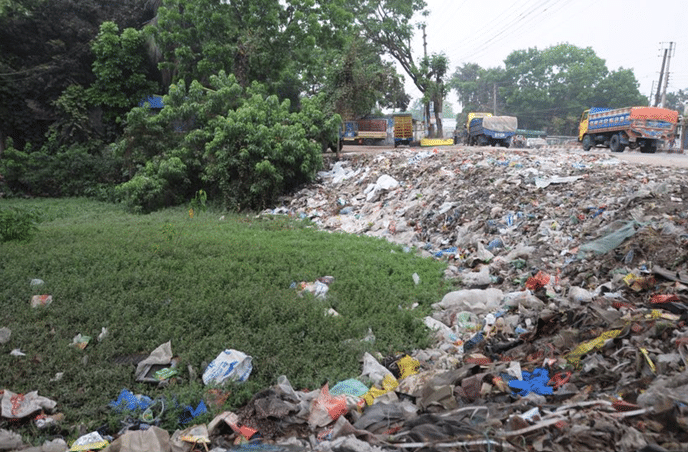
Plastic is incredibly useful and convenient, but it also causes pollution that damages health and the environment.
In some parts of the world, formal waste disposal services aren’t coping with the amount of waste being created. This is the case in Bangladesh, where Practical Action is working with informal waste workers, local NGOs and the Government to find solutions to the waste crisis.
Insufficient waste management means that plastic, including recyclable plastic, is dumped on open ground and in rivers. Plastic in rivers can block water channels and pollute sources of fresh water. Burning plastic releases toxic gasses that can cause illness. Plastic waste in landfill releases carbon dioxide and other greenhouse gasses, including methane, which contribute to the climate crisis.
A lot of plastic waste ends up in the sea. Plastic in the ocean harms marine life and becomes part of the food chain.
Around the world, solutions to plastic pollution are being developed that are already making a difference in Bangladesh and around the world. In this guide, find out how you can prevent plastic pollution in your own life with these simple, easy changes.
In 2018, Great Britain’s Royal Statistical Society’s statistic of the year was all about plastic waste. 90.5% of all plastic waste has never been recycled. Estimated at 6,300 million metric tonnes, researchers calculated that about 12% of plastic waste has been incinerated, while about 79% is either in landfills or polluting the environment.
Also in 2018, Collins Dictionary named “single-use” their word of the year, citing a four-fold increase in usage since 2013. The term means “made to be used once only” and refers to “items whose unchecked proliferation are blamed for damaging the environment and affecting the food chain”.
By sharing news stories like these with other through your social networks, you can do you bit to get the word out about the dangers of plastic pollution and the importance of taking positive action, including making use of the 6 Rs. Don’t underestimate the difference you can make – just a few social posts each month can help promote the issue of plastic waste and change people’s behaviour.
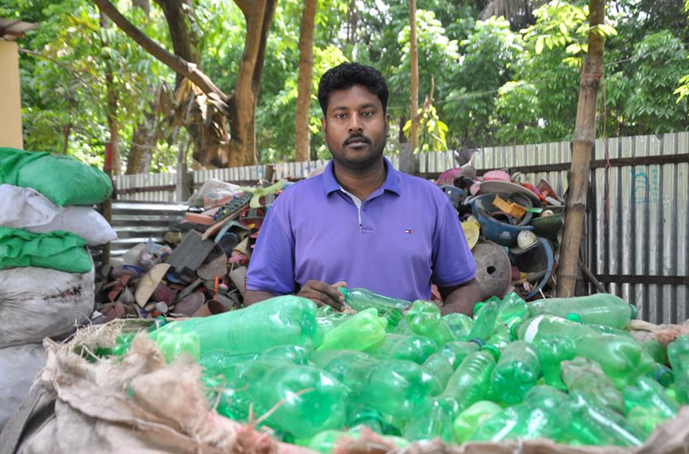
Recycling plastic into new products
Recycling plastic produces lower carbon emissions because less energy is used sourcing and processing new raw materials. It also keeps potentially methane-releasing waste out of landfill sites – a vital step in tackling climate change.
In some parts of the world, plastic recycling opens up opportunities for entrepreneurs like Rajon (pictured) to earn a living as a vital link in the recycling chain. We’re working with informal waste workers in Faridpur, Bangladesh so they can lead the way transforming how different types of waste are managed in the city.
Reducing plastic consumption
In 2016, France became the first country in the world to ban the manufacture and sale of single-use plastic cups, cutlery, plates, and takeaway food boxes. The law requires all disposable tableware to be made from 50 per cent bio-sourced materials that can be composted at home.
Practical Action is working with the Government of Bangladesh to raise awareness of plastic pollution and improve waste management in the country. Our cycling rally in Faridpur in March 2022 encouraged the city’s younger residents to separate plastic waste in their household so it can be more easily collected and recycled.
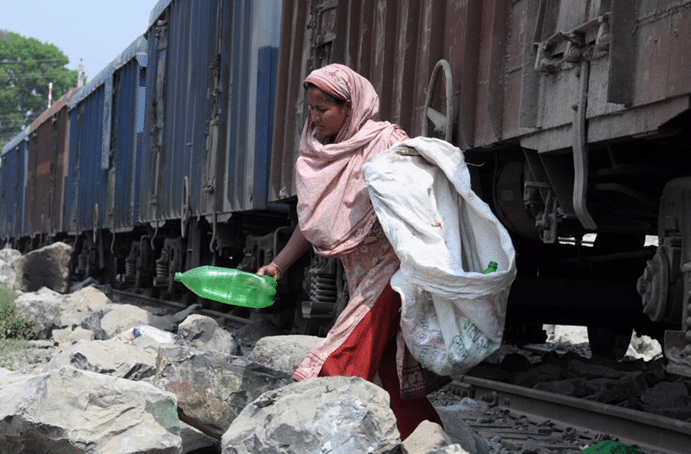
Raising awareness of the solutions
With the assistance of Practical Action, I’ve joined a co-operative. There are many benefits to my health and security. I’ve been able to save some money through the co-operative savings scheme. It makes it easier to pay for essentials like clothes and shoes for my children.Taslima Begum, plastic waste collector
We’ve explored some of the solutions being developed to fight plastic pollution – from national government initiatives and Practical Action’s work in Bangladesh to individual actions that add up to a big difference.
You can help news of these solutions spread by sharing them with others. Share the stories of waste pioneers like Taslima with your social network. Post about your own efforts to reduce, reuse and recycle your plastics. Or team up with others in your community to call on local businesses to take positive action to reduce plastic waste.
Don’t forget to tag us in your social media posts. We love to hear your stories!
Follow us on social media
Next steps
The damage plastic does to people’s health and the environment mean that we all need to work together to find solutions to reduce our plastic consumption, while reusing and recycling existing plastic products.
Explore Practical Action’s approach to waste management further through our Managing Our Waste 2021 report, which calls for a people-centred approach to the waste crisis, including plastic waste. Find out how, rather than focusing on waste flows and particular types of waste, we must turn attention to the waste services people need, and to opportunities for the most marginalised to be a core part of the solution.
